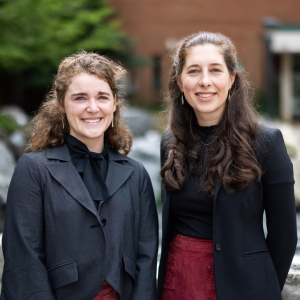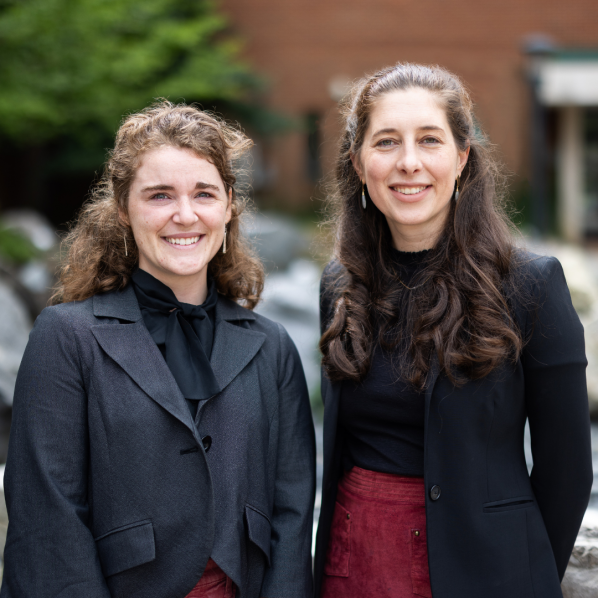BOONE, N.C. — Natural disasters and climate change have a significant impact on the mental health of young people around the nation, according to new research led by Dr. Jennifer Runkle, a researcher at North Carolina State University and Dr. Maggie Sugg, associate professor and honors program director in App State’s Department of Geography and Planning. In findings recently published in The Journal of Climate Change and Health and co-authored by a team of App State researchers and students, climate stress was found to be a major factor in depression, anxiety and feelings of hopelessness among young populations. But the research also revealed ways they are taking measures to rally, build support networks and engage on behalf of the environment.
The study, “Eco-anxiety, climate concern, and fatalistic outlooks: Insights from U.S. crisis text conversations on climate distress,” examined 337 anonymized text conversations from Crisis Text Line, a popular no-cost digital crisis platform with more than 9 million conversations logged since 2017. The study found that 65 percent of the texters were aged 14-24, predominantly female, and experienced high rates of depression, anxiety and hopelessness, while 59 percent of fatalistic texters experienced suicidal ideation.
“We identified three distinct emotional response patterns: eco-anxiety (61%), general climate concern (25%), and fatalistic outlook (31%),” Sugg said. For those with eco-anxiety, climate change was identified as a primary cause of stress. With general climate concern, climate change was mentioned alongside other stressors but was not the primary one, while those with fatalistic outlook identified climate change as the key reason for distress and suicidal thoughts.
Research shows that people of all ages experience climate distress, but the young are disproportionately impacted, with a 2021 global survey of 10,000 children and adolescents revealing 6 out of 10 were very or extremely anxious about climate change. There is now a need to understand how this anxiety manifests in real crises and what approaches might best support those experiencing acute distress, Sugg suggested.
“Real-world implications are substantial,” she said. “Crisis counselors need specific training to address climate-related mental health concerns; schools and communities need resilience-building programs tailored for youth; and mental health professionals need evidence-based interventions—particularly for those with fatalistic outlooks who are at higher risk for suicidal ideation.”
The use of large-scale crisis text data provided insights beyond the scope of traditional survey techniques and reached across demographic groups and geographic regions, Sugg said.
The findings will inform Sugg’s project, “Assessing Mental Health Disparities in At-Risk Youth After Climate Disasters in Louisiana, USA,” funded at $1 million by the National Academies of Sciences, Engineering and Medicine's Gulf Research Program. That project will continue to use digital crisis platforms to study climate disasters and their impact on youth mental health in coastal communities.
“This data-driven approach enables us to develop targeted interventions that address the psychological effects of climate change and extreme weather events while building resilience in vulnerable populations,” Sugg said.
The text conversations revealed that media coverage of climate events, political responses and the texters’ own experiences with extreme weather were contributing to their sense of distress. The transcripts also indicated that young people are developing coping mechanisms that could inform the development of intervention measures.
“The results from this work suggest youth respond to climate change in dynamic ways,” said co-author Sophie Ryan, a climate and health research fellow with the Department of Geography and Planning at App State. “Undergoing a large-scale thematic analysis highlighted context around climate stress, such as government responses and social media, which were identified as exacerbating the anxiety, distress and fatalistic outlook that youth are experiencing in response to the climate crisis. It was also really interesting—and hopeful—to see the coping strategies youth identified, including help-seeking, spending time outdoors, and engaging in strong social networks to manage their climate-related distress."
The research was funded through a 2022 grant of $413,598 from the National Institute of Environmental Health Sciences (NIEHS) administered by App State’s Research Institute for Environment, Energy and Economics (RIEEE). Co-author Dr. Martie Thompson, distinguished endowed professor of public health in App State’s Departments of Kinesiology and Public Health, found the research particularly relevant in the light of unfolding dual crises in climate and mental health.
“The mental health of young people is a significant public health concern, with suicide being the second leading cause of death among 10–24-year-olds,” Thompson said. “Although many factors contribute to mental health, the emergence of stressors that young people have little control over, such as climate change, has corresponded with a decline in youth mental health."
Co-author Emma Getz, a senior from Cary majoring in public health at App State, indicated the research is a wakeup call.
“These findings don’t just help us understand their distress, they point to the urgent need for stronger mental health support systems and meaningful investment in the spaces where young people learn, grow and seek help,” Getz said. “We need to meet this challenge with the same urgency we bring to climate mitigation itself."
Other App State student co-authors were: Ian Berry, a junior from Kent Island, MD, majoring in geography; Arden Mckee ‘24, a geography major from Cary; and Ashley Mallare ‘24, a public health major from Cary.
###
About the Department of Geography and Planning
The Department of Geography and Planning promotes the understanding of the spatial dimensions of human behavior within the physical and cultural systems of the earth, and the role of planning in achieving improvement in those systems. The department offers degrees in geography and in community and regional planning. Learn more at geo.appstate.edu.
About the Departments of Kinesiology and Public Health
The Departments of Kinesiology and Public Health in Appalachian State University’s Beaver College of Health Sciences delivers student-centered education that is accentuated by quality teaching, scholarly activity and service. The department includes two undergraduate academic disciplines: exercise science and public health. The department also offers master’s degrees in exercise science and public health, which prepare students for advanced study in a variety of related fields as well as research. Learn more at phes.appstate.edu.
About the Research Institute for Environment, Energy and Economics
Since 2008, Appalachian State University’s Research Institute for Environment, Energy and Economics (RIEEE) has fostered interdisciplinary research on the environment, energy and economics, especially the areas in which these subjects intersect. The institute serves as an umbrella organization for three research centers: the Appalachian Energy Center, Center for Economic Research and Policy Analysis, and Southern Appalachian Environmental Research and Education Center. Additionally, the institute manages and supports App State’s student-led solar vehicle team, Team Sunergy — an exemplary model of the integrative and experiential student learning, leadership and innovation opportunities the institute seeks to foster at App State. Learn more at rieee.appstate.edu.
By Bret Yager
August 22, 2025
BOONE, N.C.

